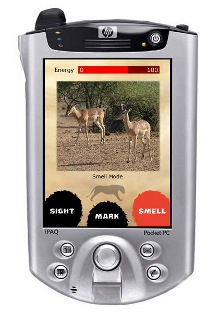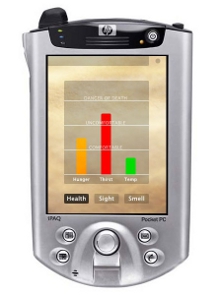A magazine where the digital world meets the real world.
On the web
- Home
- Browse by date
- Browse by topic
- Enter the maze
- Follow our blog
- Follow us on Twitter
- Resources for teachers
- Subscribe
In print
What is cs4fn?
- About us
- Contact us
- Partners
- Privacy and cookies
- Copyright and contributions
- Links to other fun sites
- Complete our questionnaire, give us feedback
Search:
The Virtual Savannah
Once it was thought by some "big game hunters" that the greatest hunting thrill was to hunt a lion. Much more exciting surely would be to hunt with a pack of lions...out in the school playing field.

Mobile technology is now a part of our lives, from iPods to mobile phones, watches to Tamagotchis, most people now wear a computer or carry one in their bag everyday. One challenge for computer scientists and electronic engineers is to create the basic technology to allow all this to happen: what is the best technology to allow a mobile gadget to know exactly where it is, for example? Another challenge for the computer scientists, once the basic technology works, is to help design new experiences made possible with this technology.
How, for example, might mobile technology best be used to make school more fun? What matters most to make learning engaging? ... Complicated graphics? Authentic challenges? Precise location awareness? A team from Futurelab, the BBC's Natural History Unit, Hewlett Packard, the University of Bristol and the Mixed Reality Lab at the University of Nottingham decided to explore these issues with a novel way to learn. They realized initially that the BBC's huge amounts of wildlife footage, when combined with state-of-the-art mobile phone technology, could be used as the basics of lessons in animal behaviour that were as much a game as they were a class. Enter the lions.

The Virtual Savannah is the result. The way it works is that the class spend the day acting out being lionesses, trying to live on the Savannah. To survive they must behave like real lions, marking out territory (done by spraying ... guess what!), hunting as a pack - the ultimate in team work challenges if you are to eat that day, and survive the dry season. All this is done on the playing fields. As the trainee "lions" move around the playing field, their mobiles keep track of where they are on the Savannah, showing them pictures of their surroundings including other animals that are nearby. The lions signal to each other using the handset (so don't worry "spraying" for the virtual lions is done at the touch of a button!). To survive the challenges the participants can spend as much time back in the classroom as they wish learning how they must behave to survive. Lots of resources are available but which ones they use is up to them. If the virtual lionesses struggle over a challenge, such as hunting as a pack, then they can, if they like, go back inside and learn more and so improve. Not the way a lion learns maybe, but still effective!
The Savannah experience has been trialled on a class of year 7 pupils who thought it was way better than normal lessons. The class had fun and learnt. The researchers, meanwhile, found that engaging learning experiences don't actually need lots of fancy graphics or hardware like virtual reality headsets. A minimal amount of video and audio can transport people to a virtual world outside their normal experience. Our imaginations are enough to do the rest. What matters most is that the challenge itself is a real and engaging one.
So in future, rather than watching a David Attenborough film about your favourite animals you could actually be out there being one (though if you are an antelope, watch out for those lions - they are pretty good at it now).


